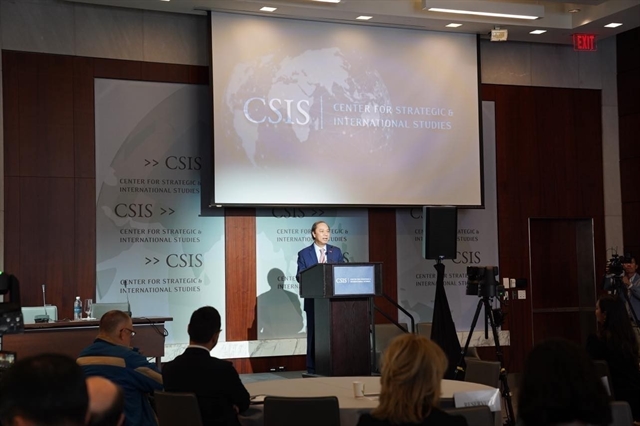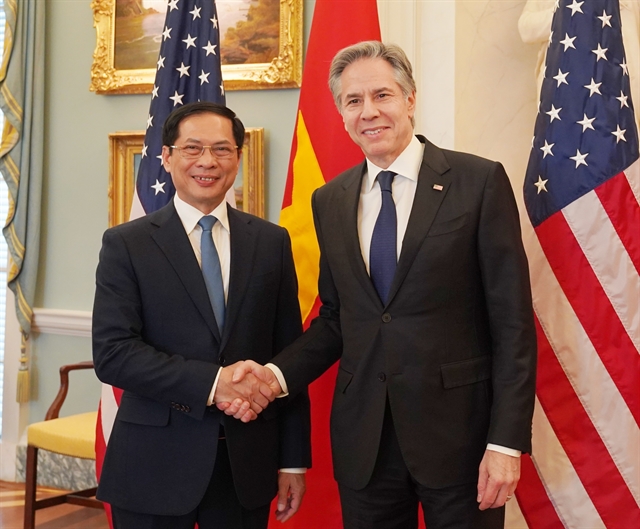 Politics & Law
Politics & Law

 |
| Minister of Foreign Affairs Bùi Thanh Sơn and US Secretary of State Antony Blinken chaired the first ministerial-level meeting in Washington DC on March 25. — VNA/VNS Photo Kiều Trang |
WASHINGTON DC — Việt Nam's Minister of Foreign Affairs Bùi Thanh Sơn and United States' Secretary of State Antony Blinken co-chaired the first Việt Nam-US Dialogue at the foreign ministerial level in Washington DC on March 25 (local time).
This was also the first ministerial-level dialogue between the two countries since they established their comprehensive strategic partnership in September 2023 when US President Joe Biden visited Việt Nam at the invitation of Vietnamese Party General Secretary Nguyễn Phú Trọng.
Describing the dialogue as an important opportunity to review and promote the implementation of high-level agreements, Blinken affirmed that the US valued its comprehensive strategic partnership with Việt Nam, and supported a strong, independent, resilient, and prosperous Việt Nam that bolsters regional prosperity and stability and takes on an increasingly important role in the Association of Southeast Asian Nations (ASEAN) as well as in the region and the international arena.
He emphasised the US’s commitment to implementing the new relationship framework and agreements of the two countries' high-ranking leaders.
Sơn, for his part, asserted the US was a strategically important partner of Việt Nam, emphasising that the upgrade of the bilateral relations was a right decision demonstrating the strategic vision of the two countries' high-ranking leaders and efforts to strengthen bilateral cooperation in accordance with the interests of the two peoples, contributing to peace, stability, cooperation, and development in the region.
Việt Nam would continue working with the US to implement the comprehensive strategic partnership in an increasingly effective, substantive, and stable direction, while expanding the room for cooperation on the basis of respect for each other's independence, sovereignty, and territorial integrity and political institutions to maintain development momentum for decades to come.
Economic, trade, and investment cooperation would continue to be a crucial driving force in bilateral relations, the two sides agreed.
Cooperation in areas such as security-defence, education-training, healthcare, science-technology had seen positive developments, with efforts to address the lingering consequences of war being a bright spot (with notable example being the dioxin cleanup project at Biên Hoà airbase).
New areas of cooperation, such as climate change adaptation, energy transition, science-technology, innovation, technology transfer, and semiconductor industry workforce training, were receiving attention from both sides and were being actively promoted.
The two officials discussed measures to deepen relations between the two countries. They agreed to promote the foreign ministerial-level dialogue to strengthen the close collaboration between the two foreign ministries in implementing high-level agreements, effectively implement existing bilateral cooperation mechanisms, and actively coordinate with each other to hold activities to celebrate the 30th anniversary of the normalisation of the two countries' relations in 2025.
They also exchanged views on regional and international issues of mutual concern. Minister Sơn proposed the US continue to play an active role contributing to maintaining peace, stability, cooperation and development in Asia-Pacific and the Indian Ocean as well as in the world.
Blinken affirmed that the US supported ASEAN's central role in the region and would maintain cooperation within the framework of the ASEAN-US comprehensive strategic partnership. He also stressed his country’s backing for the Mekong - US cooperation.
The two sides then discussed the East Sea (known internationally as the South China Sea) issue and agreed on the importance of peace, security, stability, freedom of navigation and overflight in the East Sea; solving disputes through peaceful means, in accordance with international law, including the 1982 UN Convention on the Law of the Sea (UNCLOS); fully implementing the Declaration on the Conduct of Parties in the East Sea (DOC); and working towards an effective and substantive Code of Conduct in the East Sea (COC). — VNS




